
CBA2016-04MY-Jayasinghe (Dutta)
Lessons learnt from implementing training on Ecosystems Resilience in a Changing Climate for sectoral development in South and Southeast Asia
Keywords
Capacity building · Climate change · Course Evaluation · Likert scale
Highlights
- A unique opportunity to initiate mainstreaming ecosystem resilience into the government sector as well as integrating the idea amongst the research community.
- Practitioners and the research community with no prior experience could be effectively trained in four days to initiate the integration of ecosystem resilience in their respective sectoral development plans.
- The success of the training was strengthened by collaborative interaction among newly trained practitioners, facilitators and members of the ecosystem management fraternity.
- Opened new avenues of collaboration for the stakeholders as ecosystem resilience in changing climate is to be carried out in an integrated manner by all the stakeholders rather than in silos.
1. Introduction
Addressing climate change impacts, developing an adaptation strategy and an action plan are challenging and complex tasks. Weather pattern worldwide has been impacted by the effects of climate change (Singh & Singh, 2012), which is leading to limitations in planning and decision-making based on information on traditional and indigenous knowledge of farmers. It is also well known that agro-ecosystems are fragile to environmental shocks. Climate change affects agro-ecosystem due to changes in regular weather and climate patterns, creating compound effects through droughts, floods, heat waves and other hydro-meteorological events.
Climate has a significant environmental influence on ecosystems. Climate change has been making measurable impacts on agriculture in a wide range of economies, crops and farming systems affecting crop productivity, food security and livelihood security (Weerasinghe, Arambepola, Rathnayake, & Nawaratne, 2014). Climate change not only affects ecosystems and species directly, but it also interacts with other human stressors such as development. Although some stressors cause only minor impacts when acting alone, their cumulative impacts may lead to dramatic ecological changes. Therefore, awareness creating through training and capacity building programmes would help study problems and addressing policy issues while also mainstreaming ecosystem resilience through effective use of climate and weather information. This would also allow strengthening interactions among the scientist and policymakers to improve policy-decision for ecosystems resilience (Weerasinghe et al., 2014).
Given the above, practitioners and policymakers require 1) an understanding of weather and climate and slow and rapid onset of disasters; 2) orientation towards disaster preparedness based on climate outlook. These are essential to mainstream the application of climate information and utilize adaptive technological solutions as remedial measures to improve agro-ecosystems and secure agriculture livelihoods. The purpose of the manuscript is to discuss the lessons learned and the challenges faced in carrying out the multi-country training on “Ecosystems Resilience in a Changing Climate”.
2. Methodology
The four-day training course was conceptualized to create awareness and build the capacity of relevant government officials and practitioners in Nepal, Sri Lanka, Thailand and Viet Nam for effective utilization of weather and climate information, and adaptive technological solutions in order to enhance agro-ecosystem resilience. As the majority of the agro-ecological systems in the four countries were rural, thus the main thrust in building resilience of rural social-ecological systems was to ensure the sustainability of livelihoods, which underwrites food security of rural communities.
The course adopted a broader paradigm where the resilience of agro-ecological systems was entwined with concepts of sustainable livelihoods and food security. It embraced a view of agro-ecosystems inclusive of land farming systems & livestock, aquaculture, fishery and forestry practices (FAO, 2015) which strengthen rural livelihoods, their sustainability and diversity, and contribute to food security. It endeavoured to provide the participant with the know-how on analyzing factors that influence sustainability and resilience of agro-ecosystems and develop interventions to sustain the productivity of these systems in the face of climate change by integrating weather and climate information. The course was designed as a Training of Trainers (ToT) course to enable customization by national-level organizations to train sub-national/provincial level officials to support long-term sustainability towards mainstreaming agro-ecosystem resilience.
One unique aspect of the four training modules developed for the course was the incorporation of experiences gathered from a development program run by the Asian Disaster Preparedness Center (ADPC). The program was conducted from 2012-2015 in the Nilwala river basin of Sri Lanka and Mekong river basin of Viet Nam with funding from Australian Aid. The focus of the program was on mainstreaming the application of climate information to enhance agro-ecosystem services and functions. The program provided the know-how on analyzing factors that influence sustainability and resilience of agro-ecosystems and develop interventions to sustain the productivity of these systems in the face of climate change by integrating weather and climate information. The field research activities of the program provided opportunities to work with farmers in real situations by rallying all the stakeholder organizations (central government, local agriculture, irrigation, meteorological authorities, University of Ruhuna, Sri Lanka and Cantho University, Viet Nam) on to a common platform, which was used to develop course material and trainer guidelines. The training course modules on “Agro-ecosystem Resilience in a Changing Climate”, developed from this project, modified through a curriculum review process to suit national-level participants for the current training course. The four modules were finalized through a consultative process and underwent extensive review from external experts.
- Module 1: Relevance of Disaster and Climate Risk Management for Sustainability of Social-Ecological Systems: This module introduced basic terminology of disaster risk management, climate change science and impacts of climate-related disasters in the agriculture sector. It also described the agro-ecosystem as a social-ecological system, and ecosystem-based approaches (EBA) are required to build their resilience.
- Module 2: Generation and Application of Weather and Climate-Related Information: This Module provided a discussion of climate information generation, their dissemination and potential applications to build the resilience of agro-ecosystems.
- Module 3: Planning for Vulnerability Reduction and Resilience Building of Agro-ecosystems: This Module provided background information for project formulation using accepted approaches and tools including Theory of Change, Log frame Analysis, Multicriteria analysis, and others. This formed the basis for the scenario-based group work.
- Module 4: Synthesis of Learnings through a Scenario-Based Exercise: During this module, participants applied their learnings from previous modules to develop a climate resilience strategy based on a given scenario suitable for their respective country.
The training course was designed, and materials prepared, taking into consideration the following:
- Limited focus of training on agricultural techniques, which often neglects the relevant principles of the environment such as recycling, enhancement of natural processes, and the synergy between various elements;
- Limited availability of good, experienced trainers in terms of content, training methods, approaches and skills;
- Poor documentation of training experiences;
- Limited availability of relevant training materials;
- Lack of participatory training and extension approach combining environmental education and agriculture;
- Limited exchange of training information between environment and agriculture trainers
The first three training courses were conducted in Ho Chi Minh City, Viet Nam from 29 May to 01 June 2017; Colombo, Sri Lanka from 12-15 June 2017 and Phetchaburi, Thailand from 27-30 March 2018. the fourth training course was conducted at Kathmandu, Nepal from 5-8 June 2018 and the final course was conducted in Chilaw, Sri Lanka from 27-30 May 2019. The training course constituted lecture-based classes, case study screening on building the resilience of an agro-ecosystem, group work on weather and climate information dissemination, theory of change, logical frame analysis, multi-criteria analysis, cost-benefit analysis and country-specific scenario-based exercises. Through this course, the participants had greater opportunities to interact with facilitators and exchange their experiences, views and ideas throughout the course and during their presentations.
Towards the end of each training course, an evaluation questionnaire was provided to each of the participants. The anonymous questionnaire enabled to understand the expectations of the participants and also enabled to evaluate the knowledge gained during the training (Verhougstraete, Brothers, Litaker, Blackwood, & Noble, 2015), overall training experience, training material, training technique/environment and organization. The evaluation questionnaire comprised of several Likert-type (Chang, 1994; Croasmun & Lee, 2011; Boone & Boone, 2012; Sullivan & Artino Jr, 2013) scaled questions (Verhougstraete et al., 2015) as well as open-ended questions aimed at supporting the Likert-type scaled questions. Responses for Likert-type scaled questions were evaluated using percent agreement. A thematic classification of the open-ended questions was also carried out. The evaluation aimed to obtain participants feedback on the following: 1) overall training experience; 2) time allocation on training components; 3) course delivery including training material and method and 4) knowledge transfer and relevance. The questionnaire provided is summarized in Table 1, including the type of answer, i.e. Likert-type scale or short answer. The evaluation was carried out with input from capacity development experts within the organization.
|
Evaluation topic |
Question Number |
Question |
Response Type |
| Overall Course Evaluation |
Q1 |
How much did you learn from the course? |
Likert-type scale |
|
Q2 |
What are the other subjects that should be added to the course? |
Short answer |
|
|
Q3 |
What are the subjects that should be removed from the course? |
Short answer |
|
| Time Allocation |
Q4 |
Theoretical Content |
Likert-type scale |
| Group Activities |
Likert-type scale |
||
| Group Discussion |
Likert-type scale |
||
| Experience Sharing |
Likert-type scale |
||
| Game Activities |
Likert-type scale |
||
| Course Organisation (Logistics) |
Q5 |
Effectiveness |
Likert-type scale |
| Helpfulness |
Likert-type scale |
||
| Overall Coordination |
Likert-type scale |
||
| Course Delivery Evaluation (Day wise Topic) |
Q6 |
Overall Content |
Likert-type scale |
| Method of Delivery |
Likert-type scale |
||
| Workbook Content |
Likert-type scale |
||
| Target Audience |
Q7 |
Have the organizers correctly identified the target audience? Or any other gap in the competency of the audience? |
Short answer |
| Knowledge Transfer and Relevance |
Q8 |
How do you apply the knowledge you have gained from the course? |
Short answer |
|
Q9 |
What are the suggestions to implement new concepts learnt from the workshops at your institutions? |
Short answer |
|
|
Q10 |
How do you plan to clarify any doubts on the content, or about the implementation? Have you built contacts with facilitators? |
Short answer |
|
|
Q11 |
How do you plan to approach the heads of your organization in applying the content learnt in the course? |
Short answer |
|
|
Q12 |
Do you think the content delivered in the workshop is relevant/irrelevant to your organization? List pros and cons.? |
Short answer |
|
|
Q13 |
Other comments and suggestions? |
Short answer |
Table 1. Summary of questions on the written training evaluation.
3. Results and discussion
Participants’ responses to the evaluation questionnaire were mostly constructive and in most of the cases positive. The following section discusses the feedback from participants (questionnaire responses) and analyses the lessons learnt from the training courses. The data analysis has been carried out for only the workshops held in Sri Lanka, Thailand and Nepal as the Viet Nam training course was a pilot run of the developed training modules and responses to the questionnaire are not comparable with the other three countries. In fact, some of the questions of the questionnaire were modified or added after the Viet Nam pilot training, and thus the response is not comparable.
3.1 Overall evaluation of the course
As shown in Figure 1, participants from Sri Lanka and Thailand expressed more positive views in their evaluations than participants in the Nepal training course. In addition to the analysis results below, the responses to the short answer questions depicted that the participants expected further knowledge on means of communication of ecosystem resilience practices to the farming community. They also expected knowledge on flood forecasting, examples of cost-benefit analysis carried out in various projects as well as country-specific examples on change management. It was also informed that a module on proposal development on ecosystem resilience would have been beneficial. One of the reasons for low satisfaction of participants in the Nepal training is lack of information on climate change impacts and resilience in Nepal (Gurung & Bhandari, 2009) and more focus on theoretical concepts than practical examples from Nepal or countries with similar ecosystems. It was also reported through the short questions that although the course was on ecosystem resilience in changing climate (Bhatta et al., 2015; Isabelle & Darling, 2010), considerable time was devoted to basic concepts and disaster.
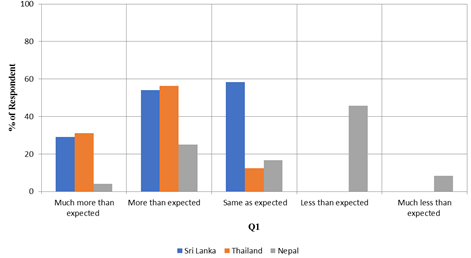
3.2 Time allocation
The time allocation on various components of the course, e.g. theoretical content, activities, the scope of interaction with the facilitator and opportunity to share amongst participants were evaluated through Q4. The analysis results are given in Figure 2. The analysis was carried out by compiling responses of all participants from three countries. It was observed that most of the participants in all three countries gave an average scoring to the time allocation for each of the training components. It was observed that experience sharing was just adequate and could have been allocated more time.
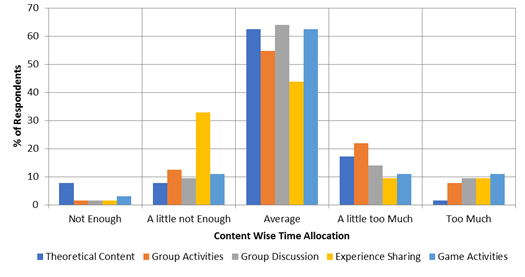
3.3 Course organization
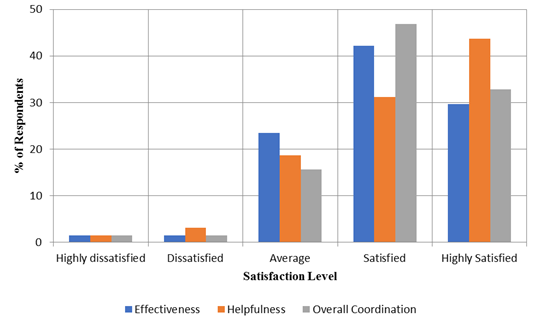
The course organization, including effectiveness and overall coordination, received a considerable satisfaction level from more than 40% of the participants. In comparison, more than 40% were highly satisfied with the helpfulness of the course organizers. The majority believed that the logistics were adequate, and the overall coordination was satisfactory.
3.4 Course delivery
The evaluation also considered course delivery mechanism which tried to understand the participants view on the overall technical components of the course which constituted of four modules delivered over four days, as well as facilitators’ competency. The responses of the participants’ country-wise are analyzed below. The Likert scale for content was classified as 1 = not useful, 2 = not so useful, 3 = average, 4 = useful, 5 = very useful while the Likert scale for Method of Delivery and Workbook Content were classified as 1 = strongly need improvement, 2 = need improvement, 3 = neutral, 4 = good, 5 = very good. Figure 4, 5 and 6 shows that majority of the participants of the training course in three countries found the content useful or very useful and found the method of delivery and Workbook content good or very good.
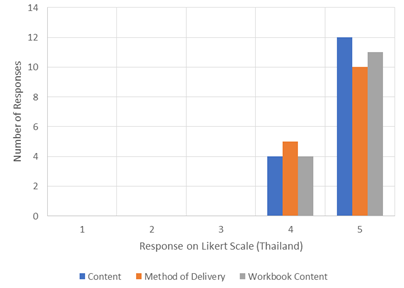
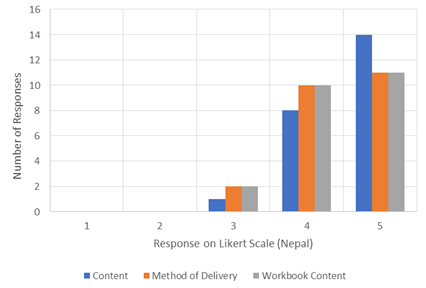
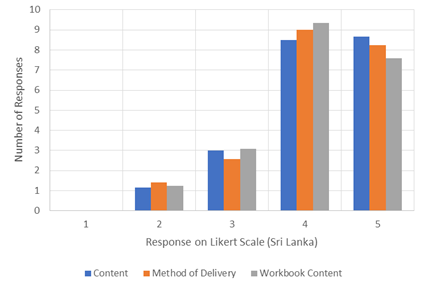
Based on the analysis for individual countries, the average responses of participants (Likert, 1932) were also analyzed for questions 1, 4.1 – 4.5, 5.1 – 5.3 and 6.1 – 6.3 as shown below. The average response is calculated using the following formula:
\(Average response = \frac{\sum_{i=1}^{5}L_1f_1}{n}\)Where \(L_1\) = Value of the Likert scale response (from 1 to 5),
\(f_1\) = Number of the responses for the respective value of the Likert Scale and
\(n\) = Number of total responses
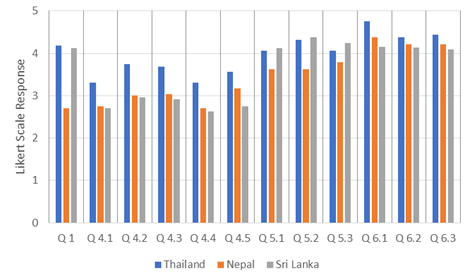
It should be noted that question 4 refers to time allocations, 5 refers to the ADPC logistics support, and 6 refers to the course delivery evaluations. Figure 7 indicates that the average response in Likert type scale question is average to good which indicates the overall success of the course.
3.5 Target audience, knowledge transfer mechanism and relevance
Several short answer questions were also part of the evaluation questionnaire, and the response of the participants indicated that facilitators were competent enough to deliver the course and most of the participants indicated they were satisfied with the facilitators. Regarding the target audience, it was indicated that although there was a mix of participants from sectors, participation from some important stakeholders were missing, such as wildlife, agro-researchers and coastal management authorities. Regarding the transfer of knowledge gained through the training course most of the participants indicated that they foresee transfer of knowledge by the development of proposals in the subject area with relevant stakeholders, organizing training courses within their respective organization for knowledge dissemination and ground-level implementation. Some of the participants indicated that they would discuss with relevant authorities of the organization for integration into programs of the department. Regarding the relevance of the course to the organizations represented, the majority of participants indicated that the training course was highly relatable to their organizations’ work profile.
3.6 Future training course
The training course evaluation questionnaire and personal feedback from participants taught us that the biggest impediments to the universal adoption of ecosystem resilience would be variability across users. While there is no immediate solution for this, but the key to success would be mainstreaming ecosystem resilience into the workflow of major sectors like agriculture, water resources, coastal systems and integrated approach amongst the stakeholders.
Following participants’ feedback, we suggest implementing the points below in future training courses:
- Reduce theoretical lecture time
- Provide more practical-oriented lectures including an introduction to decision-making software tools
- Increase group activities and critical thinking assignments
- Increase time for cost-benefit and multi-criteria analysis
- Enhance time management
- Provide orientation on ecosystem resilience-related proposal writing for better mainstreaming in sectoral development plans
4. Conclusion
The four training courses gave a unique opportunity to initiate mainstreaming ecosystem resilience into various sectors of the government as well as integrating the idea among the research community. The key findings of the four training activities demonstrated that 1) practitioners and research members of the community with no prior experience could be effectively trained in four days to initiate integration of ecosystem resilience in their respective sectoral development plans; 2) The average set objectives of the training has been achieved in all the training courses and majority of participants have expressed satisfaction on the course content, delivery mechanism, time allocation and overall learning from the course; 3) some deviation can be observed in the training course organized in Nepal where the training course hasn’t been able to meet the expectations of many of the participants which may be due to time management and the facilitators may not have correctly identified the audience before sharing knowledge; 4) it was also noticed that some participants have stated explicitly that in one or two instances facilitators contradicted on some information amongst themselves thus requiring a more co-ordinated approach to the training in future and 5) suggestions have been provided to share pre-course material to reduce time on theoretical aspects and devote more time in practice, seminar and group interactions. It was also found that the most successful workshop was held in Sri Lanka, and this may be attributed to better coordination, choosing the appropriate trainee organization and a well-defined mix of stakeholders.
During future workshops, we suggest a daily summary and group discussion to reiterate important concepts applied daily and to elicit further inquiries. The discussion offers participants the option to reflect, enquire and receive feedback from the facilitators in an informal setting. This also helps foster peer relationships and improve peer support, leading to more significant knowledge gain.
The success of these training workshops was strengthened by collaborative interactions amongst newly trained practitioners, facilitators and members of the ecosystem management fraternity. The training course also opened up new avenues of collaboration for the stakeholders as ecosystem resilience in changing climate is to be carried out in an integrated manner by all the stakeholders rather than in silos.
Acknowledgement
The authors would like to acknowledge the support provided by the senior management of ADPC, the project partners and the partners of the four countries for conducting the training course. The authors would also like to thank Asia-Pacific Network for Global Change Research for funding the presented work under their CAPaBLE programme (APN Ref. CBA2016-04MY-Jayasinghe) leading to the present publication.
References
- Bhatta, L. D., Helmuth van Oort, B. E., Stork, N. E., & Baral, H. (2015). Ecosystem services and livelihoods in a changing climate: Understanding local adaptations in the Upper Koshi, Nepal. International Journal of Biodiversity Science, Ecosystem Services & Management, 11(2), 145-155. doi:10.1080/21513732.2015.1027793
- Boone, H. N., & Boone, D. A. (2012). Analyzing Likert Data. Journal of Extension 50(2), 1-5.
- Chang, L. (1994). A Psychometric Evaluation of 4-Point and 6-Point Likert-Type Scales in Relation to Reliability and Validity. Applied Psychological Measurement 18(3), 205-215. doi:10.1177/014662169401800302
- Croasmun, J. T., & Lee, O. (2011). Using Likert-Type Scales in the Social Sciences. Journal of Adult Education 40(1), 19-22.
- Food and Agriculture Organization of the United Nations. (2015, March). FAO’S Work on Agroecology – A pathway to achieving the SDGs. Retrieved from https://www.fao.org/3/i9021en/i9021en.pdf
- Gurung, G. B., & Bhandari, D. (2009). Integrated Approach to Climate Change Adaptation. Journal of Forest and Livelihood 8(1), 91-99. Retrieved from https://www.nepjol.info/index.php/JFL/article/view/1889
- Isabelle, M. C., & Darling, E. S. (2010). Rethinking Ecosystem Resilience in the Face of Climate Change. PLoS Biol 8(7), e1000438. doi:10.1371/journal.pbio.1000438
- Likert, R. (1932). A Technique for the Measurement of Attitudes. Archives of Psychology 22(140), 5-55.
- Singh, B. R., & Singh, O. (2012). Study of Impacts of Global Warming on Climate Change: Rise in Sea Level and Disaster Frequency Global In Warming – Impacts and Future Perspective. IntechOpen. doi:10.5772/50464
- Sullivan, G. M., & Artino Jr, A. R. (2013). Analyzing and Interpreting Data from Likert-Type Scales. Journal of Graduate Medical Education, 5(4), 541-542. doi:10.4300/JGME-5-4-18
- Weerasinghe, K. D. N., Basnayake, S., Arambepola, N. M. S. I., Rathnayake, U., & Nawaratne, C. (2014). A local level technology and policy intervention approach to restore paddy ecosystems in the Nilwala downstream, affected due to Nilwala flood protection scheme, Southern Sri Lanka. Procedia Economics and Finance, 18, 336-344. doi:10.1016/S2212-5671(14)00948-4
- Verhougstraete, M. P., Brothers, S., Litaker, W., Blackwood, A. D., & Noble, R. (2015). Lessons Learned from Implementing a Wet Laboratory Molecular Training Workshop for Beach Water Quality Monitoring. PLoS ONE 10(3), e0121214. doi:doi.org/10.1371/journal.pone.0121214